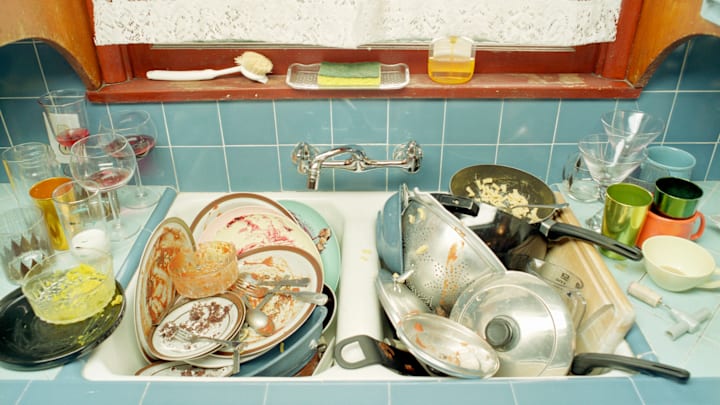Many of us are guilty of ignoring the dirty dishes in our sink under the guise of “letting them soak.” The idea is that soaking dishes in warm water will break down any stuck-on food, thus making them easier to clean when you finally feel motivated. Any excuse to procrastinate chores may sound tempting after a long day, but this habit does more harm than good: According to the Australian Broadcasting Corporation, soaking your dishes actually makes them dirtier.
The longer you leave your unwashed dishes in the sink, the more time microbes will have to grow on them. This is especially true if you let your kitchenware marinate in warm water, which can quickly turn into bacteria soup.
Harmful germs in your sink can come from many sources. If you cooked a meal with raw meat or seafood, bacteria like E. coli or Salmonella may be lingering on your knife and cutting board. In such cases, it’s best to wash the potentially contaminated dishes right away to prevent any pathogens from spreading.
Germs can also originate on fruits, vegetables, dairy, your hands, and even your sink pipes. In your kitchen sink, a small amout of bacteria can multiply fast. Sinks basins are warm, moist environments filled with nutrients from leftover food debris. In other words, they're breeding grounds for microbes.
No matter how sluggish you feel after dinner, you should wash your dishes as soon as possible to prevent bacterial growth. If you're not using a dishwasher, run the tap water as hot as you can stand it and scrub your dishes with a lot of soap. One study suggested that the most efficient way to wash dishes—and one that gets them a bit cleaner than even the dishwasher—is the two-basin method, which involves scrubbing your dishes in soapy water and rinsing them in clean water. Make sure to replace your sponges as often as possible, as they can also become germ hotbeds, and if you are using a dishwasher rather than hand-washing, don’t rinse your dishes before you pop them in.
Here are more tips that make doing the dishes less of a pain, plus some advice for how to avoid food poisoning.
A version of this story ran in 2021; it has been updated for 2023.
